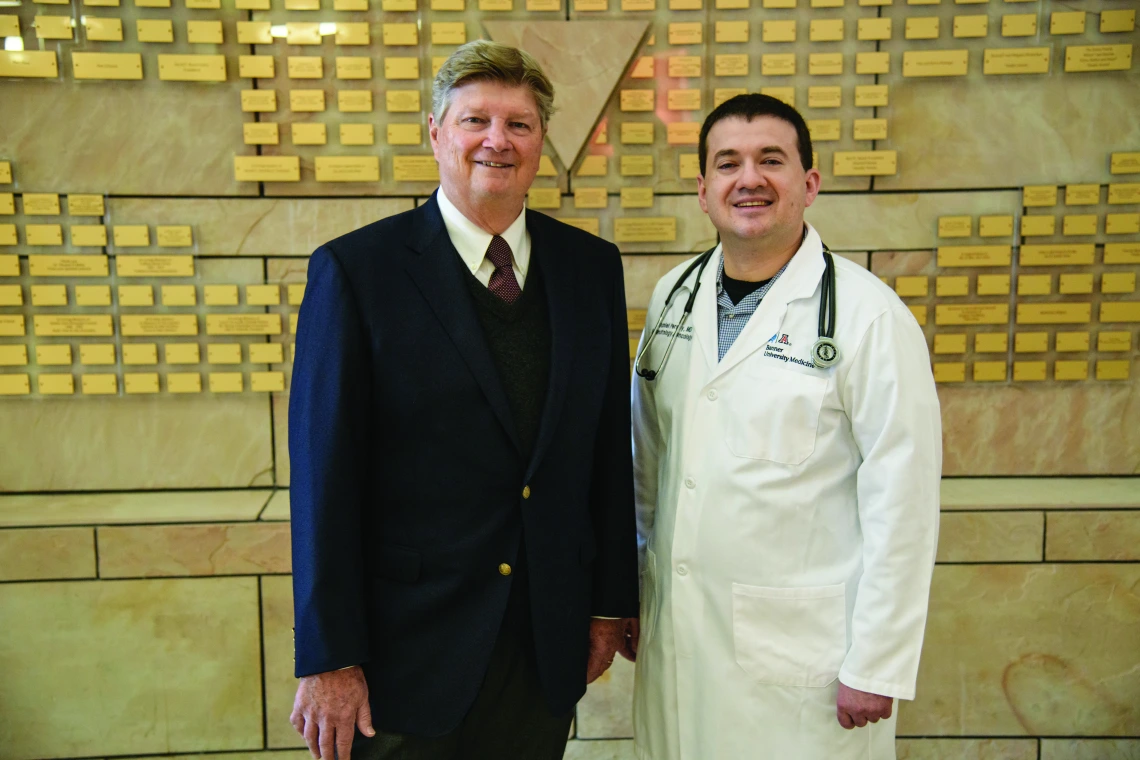Donor-Patient Profile: Jack Wilson

Married since 1973, working in the same field since coming to Phoenix from New Jersey in 1975, and living in the only house he’d ever owned, Jack Wilson’s life was the picture of consistency. Then, in 1997, an oncologist informed him he had mantle cell lymphoma.
In addition to being an unwanted wrench in an otherwise stable life, it was the wrong diagnosis.
“They had me teed up for chemo,” Jack recalls. But a week before he was scheduled to start treatment, a “little voice” prompted him to seek a second opinion. A long-time friend, who also happened to be a top cardiologist in Scottsdale, recommended he see a specialist at the University of Arizona Cancer Center.
Jack booked an appointment with Alan List, MD, then the clinical director of the Bone Marrow Transplant Program at University Medical Center in Tucson. To Jack’s relief, Dr. List advised delaying his scheduled chemotherapy treatments — and further tests revealed some additional news.
“You don’t have mantle cell lymphoma,” Dr. List told him. “You have chronic lymphocytic leukemia. The protocol on that is watch and wait.”
Jack was relieved — instead of diving headfirst into cancer treatments and all their unpleasant side effects, the chemo his oncologist in Phoenix was rushing him toward could wait. He “fired” that doctor and has been with the UA Cancer Center ever since.
Watching and waiting paid off: It was another year and a half before he embarked on his first chemo regimen — which was successful, but not before it landed Jack in the hospital.
“My red blood cell counts were plummeting,” he recalls. “They had to do some rapid work in the emergency room to get me back on track. I spent several weeks in the hospital, but at the end, I was cancer-free.”
Over the next two decades, whenever his cancer came back, a newly approved treatment drove it back into remission.
“Through this whole process, I had hope that technology was going to pull me through, and in fact it has,” Jack says.
His first and second relapses were treated with different “cocktails,” combinations of potent anti-cancer drugs that gave him years of remission. Around five years ago, when his cancer reared its head again, the FDA had just approved a pill that targets a certain protein in cancer cells.
“Today I take a pill every day, and that keeps my cancer at bay,” he says of his current treatment, ibrutinib. “I’ve had a few minor side effects, and I have a compromised immune system — but in general, this drug has been terrific.”
The UA Cancer Center cares for many appreciative patients, but some of them take that gratitude to the next level. In Jack’s case, he has made philanthropic gifts to support UA Cancer Center research. These days, he has helped support projects spearheaded by Daniel Persky, MD, director of the Clinical Trials Office — who is also Jack’s current oncologist.
“Jack has been an invaluable supporter of the lymphoma program, and of UA Cancer Center research in general,” Dr. Persky says. These research efforts range from building robust databases to enable better cancer tracking, to examining tumor proteins in non-Hodgkin’s lymphoma, to studies of aggressive lymphoma in older patients. Donors like Jack play a vital role in fast-tracking UA Cancer Center research — especially when federal grants and other forms of funding can be difficult to obtain.
In addition, for the past several years Jack has chaired the UA Cancer Center Advisory Board, working hard to increase philanthropy and raise our profile in Phoenix and Tucson. He is also recruiting “new blood” for the board, particularly in Tucson.
“We’re looking for leaders who can open doors for us in the various communities the UA Cancer Center serves,” he says. “It’s also helpful to have grateful patients serve on the board.”
Jack is optimistic about the future of the UA Cancer Center under the university’s new leadership, from fresh faces in UA Health Sciences, including Senior Vice President Michael Dake, MD, and Senior Associate Vice President Irving Kron, MD, as well as UA President Robert C. Robbins, MD.
“I’m very excited with where we’re going now,” he says. “We’ll go a long way to accelerating our mission for the UA Cancer Center.”
A cancer patient’s journey is never easy, but Jack credits the UA Cancer Center’s care with reducing not just his own anxiety, but his family’s as well.
“Having a good cancer team really does take the stress out of a lot of this,” he says. “My family was confident that I had the latest and greatest care.”
Finally, Jack’s faith in the UA Cancer Center’s expertise was bolstered by its designation as a National Cancer Institute Comprehensive Cancer Center.
“Academic medicine is what you get from a Comprehensive Cancer Center — people are really looking out for the patient,” Jack says. “The people who have taken care of me are the top in the state. They know where the technology is, what the science is, what drugs are in the pipeline — all of that has given me hope throughout the years.”



